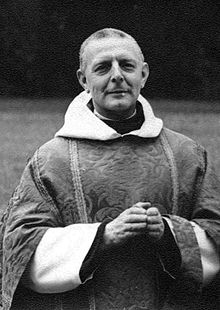I have mentioned elsewhere how I ended up a student (“find a professor you admire and study whatever it is she or he teaches. You won’t regret it.”) of the brilliant Anglican liturgist Louis Weil. A passing strange fate for both the Anglo Catholic professor and a Unitarian Universalist Zen Buddhist seminarian. I did admire him for both his intellectual brilliance as well as a quality that one might call holy, a more than rare thing in a seminary. And at the time I was trying seriously to reclaim my natal Christian tradition, even if only cramming it in with the Unitarian Universalism and Zen Buddhism, and if anyone helped me in that direction it would have to be the good professor.
Among the things I found myself exposed to was the Anglican Benedictine Dom Gregory Dix.
As it turns out in some corners of the Anglican communion today is celebrated as Gregory Dix’ feast. He is probably best recalled as a liturgist and author of the magisterial Shape of the Liturgy. A book, I should add, I read. Pretty good for a UU Zen Buddhist. Dix was other things, as well. An Anglo Catholic, of course. Of the papalist sort, wanted desperately for reunion. But also a renowned confessor and spiritual director. Another of those scholars who so rarely are spiritual adepts, as well…
So, for me, I find on this feast I’d like to geek out on the Christian communion. Just a little.
It is the central act of worship within the ancient Christian churches. And there is, obviously, something deeply ingrained in human beings around food and meals, and we know that there are sacred meals throughout our human existence.
I gather much of Dix’s work on the subject has been superseded. Even as I was studying him along side more contemporary scholars I had some suspicions about his thesis that the words of institution were not central in the earliest versions of the Eucharist, and possibly were not even included seemed unlikely. What he focused on were four actions: offertory, consecration, fraction, and communion.
For me what I most recall was the importance of the offering in his schema. For which he was, I recall, accused in some circles of being Pelagian. Something I found attractive, even if he denied it. Also there’s some hint of a Zwinglian memorialist approach to the communion, which, perhaps obviously, I have affinities with. But, the truly important thing was the value of offering, the bringing of gifts, and in the years that have followed as a UU minister conducting worship services, inspiring me to hold up the enormous spiritual power of the offering within the service.
For me today it is part of a rhythm of reflection and action, and the offering itself is a pivot point, out of which we launch into the message, which, of course, replaces for Unitarian Universalists, as with many Protestants, the liturgy of the sacrifice.
And, in some ways, my own noticing of the importance of this part of a Western worship service I owe to that monk and his meditations.
So, recalling the power of memory, ah, memory, which I do believe is in fact the most important part of the Eucharist, I lift a cup in honor Father Dix…













